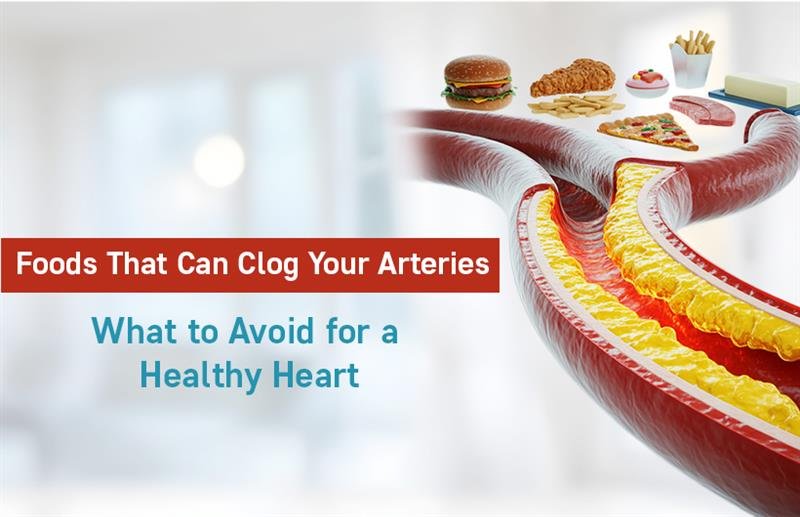Your diet plays a critical role in maintaining cardiovascular health. Whilst some foods help your arteries stay healthy and working, other artery-clogging foods can sneakily accumulate a dangerous buildup that increases your risk of heart attack and stroke.
The article will concentrate on the big-three vessels clogging foods, how they contribute to heart disease, and how to follow an artery blockage diet to safeguard your arteries. When it comes to heart health, it is as important to know the foods to avoid as it is to know the foods to consume.
What happens when the arteries are clogged?
The bloodways of your body are the arteries. Upon getting narrowed or blocked by plaque, a mix of fat, cholesterol, and calcium, among other planters, it restricts the circulation of blood to other vital organs. This disease is called atherosclerosis, and this can be a major cause of heart attack, stroke, and peripheral vascular disease.
Diet is one of the biggest plaque causes. Some Artery-clogging foods will speed up this mechanism and put you at risk of developing severe cardiovascular complications. What are the worst Artery-clogging foods? Let us look at that.
The Worst Foods to Eat Clogging the Arteries
1. Processed Meats
The highly processed Artery-clogging foods like sausages, bacon, hot dogs, and deli meats contain high levels of saturated fats, salt, and preservatives. The elements can elevate LDL (bad) cholesterol, irritate inflammation that subsequently promotes the development of plaque.
Why it’s risky:
- High saturated fat content
- Increased sodium elevates blood pressure
- Contains nitrates and nitrites, linked to arterial damage
2. Fried Foods
Fried chicken, French fries, onion rings, and other deep-fried snacks are rich in trans fats and refined oils. These fats are directly associated with clogged arteries and increased heart attack risk.
Key concerns:
- Raises bad cholesterol (LDL)
- Lowers good cholesterol (HDL)
- Promotes chronic inflammation
3. Packaged Baked Goods
Trans fats are very harmful to the health of the arteries and are found in cookies, cakes, pastries, and muffins made using hydrogenated oils. They are also full of added sugars and refined carbohydrates.
Effects on the health of the Diet and clogged arteries:
- Increases blood sugar. Spikes blood sugar
- Interferes with the normal circulation of the blood
4. Full-Fat Dairy Products
Although dairy products can be included in a balanced diet when taken in moderation, full-fat Heart attack risk foods such as cream, cheese, butter, and whole milk contain loads of saturated fats. These fats help to raise the cholesterol in your arteries.
Consider instead of:
- Lactose-free or low/fat-free dairy substitutes
- An alternative dairy milk, such as almond, soy milk, or oat milk
5. Red Meat
Beef, lamb, and pork contain cholesterol-rich fat. Too much consumption has been associated with correlation to higher chance of coronary heart disease, especially when taken in processed forms.
More healthy ones include:
- Lean poultry
- Omega-3 rich fish such as salmon or sardines
- Lentils and chickpeas are plant-based proteins.
6. Sugary Beverages
Sodas, energy drinks, sweetened teas, and fruit juices that have added sugar are providers of weight gain, insulin resistance, and high levels of triglycerides, which pose risks to clogged arteries.
Alternative beverages:
- Lemon-infused or mint-infused water
- Herbal teas without sugar
- Sparkling water with no added sugar
7. Refined Carbohydrates
White bread, white rice, pasta, and other refined grains lack fiber and cause blood sugar spikes. After a long period, some of the damage blood vessels have to deal with are high blood sugar, which speedily promotes plaque accumulation.
Better choices:
- Whole-grain breads
- Brown rice or quinoa
- Oats and barley
Heart-Friendly Tips to Keep Arteries Clear
Here are science-backed steps to promote arterial health:
- Increase fiber intake: Fiber helps reduce cholesterol and supports healthy digestion.
- Consume healthy fats: Include more nuts, seeds, avocados, and olive oil.
- Stay active: At least 30 minutes of moderate exercise most days of the week boosts cardiovascular health.
- Manage stress: Chronic stress can increase inflammation and blood pressure.
- Get regular check-ups: Monitor cholesterol, blood pressure, and triglycerides routinely.
Recognizing the Signs of Artery Blockage
While blocked arteries can be silent, some signs may indicate poor blood flow:
- Chest pain or discomfort (angina)
- Shortness of breath
- Fatigue or dizziness
- Numbness or weakness in limbs
If you experience any of these symptoms, it’s essential to seek immediate medical evaluation.
Why Early Intervention Matters
Preventing artery blockages isn’t just about avoiding a heart attack—it’s about improving your overall quality of life. Regular health checkups, good dietary decisions, and advice from experts can do wonders when working early.
It is here Dr. Jignesh Patel comes in.
Dr. Jignesh Patel Heart Specialist, Ahmedabad
In case you are looking through the keywords of heart specialist surgeon in Ahmedabad and seeking the expertise of the finest Cardiology hospital near you, Dr. Jignesh Patel is incomparable.
Reputed to have exceptional clinical records and skills in treating patients with arterial disease in a human manner, Dr. Patel has assisted more patients in dealing with and conquering arterial disease through a combination of preventive and surgical measures. Whether you need a consultation, diagnostic evaluation, or post-operative cardiac rehabilitation, Dr. Jignesh Patel provides care with a patient-centered approach supported by the latest technology and research.
Final Words
It is equally important to know what not to eat in your artery blockage diet. Foods such as fatty foods, trans fatty foods, sugary and salty foods attack your arteries gradually without any warning signs and predispose you to severe cardiovascular incidents.
The best news? As a way to take charge, you can go ahead and take control of your plate.
And when you require professional and personal support, Dr. Jignesh Patel, Cardiologist in Ahmedabad, can assist you in navigating your heart health experience with care and precision. Respect your heart before it asks for respect.
Schedule a consultation with Dr. Jignesh Patel today to take a proactive step toward a healthier heart.






